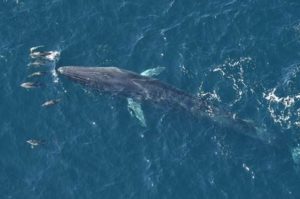
A fin whale and common dolphins seen during a New England Aquarium aerial survey of Northeast Canyons and Seamounts Marine National Monument in 2020. Courtesy of the New England Aquarium
HYANNIS – Scientists with the New England Aquarium examining marine animal sightings to identify areas of marine diversity have identified the Northeast Canyons and Seamounts Marine National Monument as one of the most diverse areas for marine mammals along the east coast.
Using data collected by the North Atlantic Right Whale Consortium from 1979 to 2020, which included sightings of over one million animals from 30 species groupings, they found that species diversity in the nearly 5,000 square mile sanctuary 130 miles southeast of Cape Cod occurred at one of the highest rates in the north and mid-Atlantic coast, echoing findings in nearby areas similarly situated on steep continental shelf edges.
“It was very exciting to see these results,” said Brooke C. Hodge, lead author of the study and Associate Scientist in the Spatial Ecology, Mapping and Assessment Program for the Anderson Cabot Center for Ocean Life at the New England Aquarium.
”Our research shows us that the Monument is diverse compared to the East Coast. It is clearly well-sited and protects a unique and diverse marine mammal community,” she said.
The Biden-Harris Administration restored the Monument’s status as a marine protected area (MPA), returning it to its initial designation under the Obama Administration which was removed during the Trump Administration.
Scientists with the Aquarium say that identifying MPAs is crucial to protecting coastal ecosystems from human related threats, finding that the removal of restrictions in the Monument had increased the risk of entanglement, bycatch and habitat destruction in a 2021 study.
“The Gulf of Maine is one of the most rapidly warming marine ecosystems in the world, and evidence of changes in productivity have already been observed. Designating MPA’s and establishing effective management measures to meet the goal of protecting areas of particular importance to biodiversity are needed to protect marine mammals and the ecosystems of which they depend.”
The study was published in Conservation Science and Practice.
To learn more, click here.
By, Matthew Tomlinson, CapeCod.com NewsCenter























